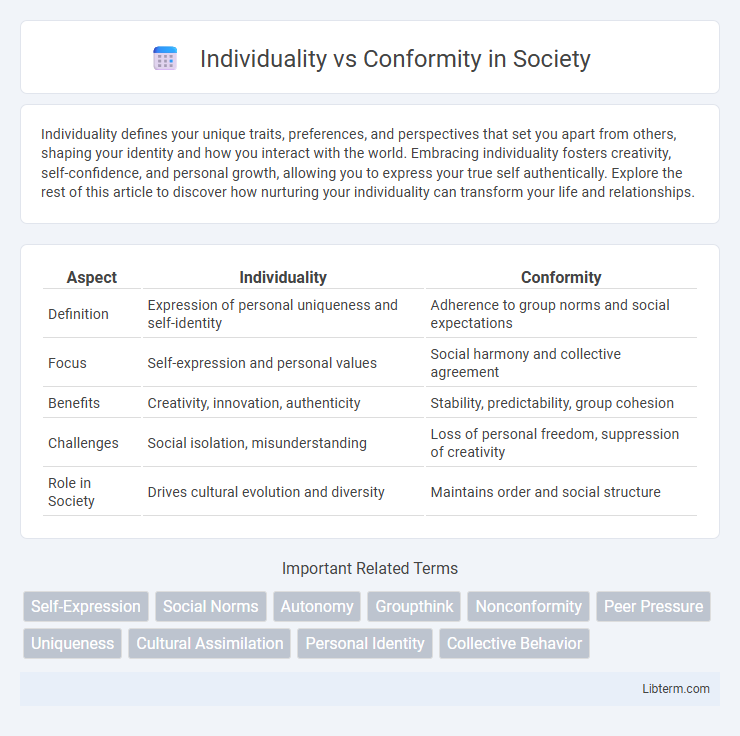Individuality defines your unique traits, preferences, and perspectives that set you apart from others, shaping your identity and how you interact with the world. Embracing individuality fosters creativity, self-confidence, and personal growth, allowing you to express your true self authentically. Explore the rest of this article to discover how nurturing your individuality can transform your life and relationships.
Table of Comparison
| Aspect | Individuality | Conformity |
|---|---|---|
| Definition | Expression of personal uniqueness and self-identity | Adherence to group norms and social expectations |
| Focus | Self-expression and personal values | Social harmony and collective agreement |
| Benefits | Creativity, innovation, authenticity | Stability, predictability, group cohesion |
| Challenges | Social isolation, misunderstanding | Loss of personal freedom, suppression of creativity |
| Role in Society | Drives cultural evolution and diversity | Maintains order and social structure |
Understanding Individuality: Defining the Self
Understanding individuality involves recognizing the unique combination of personal beliefs, experiences, and values that shape the self. Defining the self means exploring one's identity beyond societal expectations and external influences, highlighting intrinsic motivations and authentic expression. Emphasizing self-awareness and personal growth fosters a clear distinction between individuality and conformity.
The Nature of Conformity in Society
Conformity in society arises from social norms and the innate human desire for acceptance and belonging, which often leads individuals to align their behaviors, beliefs, and values with group expectations. This collective adherence helps maintain social order and predictability but can suppress personal expression and limit diversity of thought. Understanding the psychological mechanisms behind conformity, such as normative and informational influence, reveals how societal pressure shapes individual identity within community structures.
Psychological Roots of Individual Expression
The psychological roots of individual expression stem from intrinsic needs for autonomy, self-identity, and personal meaning, often influenced by early developmental experiences and social environments. Cognitive theories highlight the role of self-concept clarity and emotional regulation in fostering uniqueness amid group pressures. Neuroscientific research connects brain regions like the prefrontal cortex with decision-making processes that balance individuality against conformity impulses.
Social Pressure and the Drive to Fit In
Social pressure exerts a powerful influence on individuality, often compelling people to conform in order to gain acceptance and avoid social isolation. The drive to fit in can suppress unique traits and personal values, leading to internal conflict and diminished self-expression. Navigating this tension requires balancing the need for belonging with maintaining authentic identity.
Benefits of Embracing Individuality
Embracing individuality fosters authentic self-expression, enhancing creativity and personal fulfillment. It encourages diverse perspectives that drive innovation and problem-solving in social and professional environments. Cultivating individuality also promotes mental well-being by reducing conformity-induced stress and enabling genuine connections.
Risks and Rewards of Nonconformity
Nonconformity fosters innovation and authentic self-expression, often leading to unique opportunities and personal growth. However, it carries risks such as social alienation, reduced support networks, and potential professional setbacks. Balancing individuality with social acceptance is crucial to maximizing benefits while mitigating the challenges of defying societal norms.
The Influence of Culture on Personal Identity
Cultural norms and values significantly shape personal identity, often dictating the balance between individuality and conformity within a society. Collectivist cultures prioritize group harmony, encouraging individuals to align their behaviors and beliefs with societal expectations, while individualistic cultures promote self-expression and uniqueness. This cultural influence affects how people perceive themselves and navigate social roles, impacting their sense of self and personal authenticity.
Balancing Authenticity and Social Harmony
Balancing authenticity and social harmony requires embracing individuality while respecting societal norms to foster genuine connections. Expressing personal values and unique perspectives enhances self-awareness and creativity without disrupting group cohesion. Navigating this balance promotes a healthy dynamic where diverse identities contribute to collective well-being and mutual understanding.
Individuality and Conformity in the Workplace
Workplace individuality fosters creativity, innovation, and employee engagement by encouraging diverse perspectives and authentic self-expression. Conformity, on the other hand, promotes consistency, team cohesion, and adherence to organizational standards, ensuring efficient operations and uniformity in processes. Balancing individuality and conformity is essential for companies to maintain a dynamic yet stable work environment that drives productivity and employee satisfaction.
Nurturing Individuality in Education and Youth
Nurturing individuality in education empowers youth to develop unique talents and critical thinking skills essential for innovation and personal growth. Educational environments that prioritize personalized learning, creative expression, and open dialogue foster self-confidence and resilience against societal pressures to conform. Cultivating individuality in young learners not only enhances academic engagement but also prepares future leaders to challenge norms and contribute diverse perspectives to society.
Individuality Infographic

 libterm.com
libterm.com